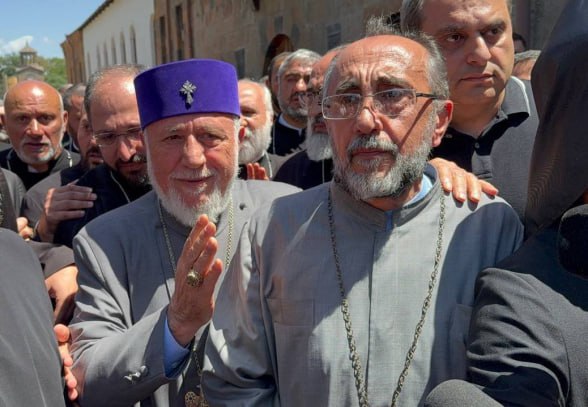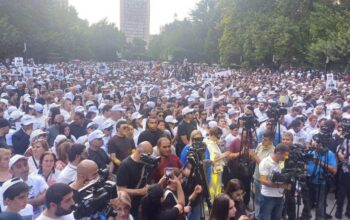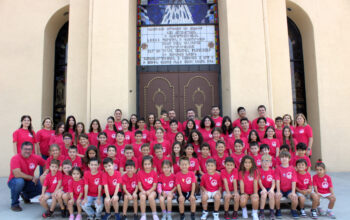Archbishop Mikael Ajapahyan, accused of calling for the violent overthrow of Armenia’s constitutional order, went on trial this week in a case his legal team and supporters insist is politically motivated.
Ajapahyan, the primate of the Shirak Diocese of the Armenian Apostolic Church, surrendered to investigators on June 27 after security forces attempted to arrest him at the Mother See of Holy Echmiadzin. The raid failed when hundreds of priests and laypeople physically blocked the authorities, forcing them to retreat empty-handed.
His prosecution comes on the heels of the arrest of another outspoken cleric, Archbishop Bagrat Galstanyan, and 14 supporters accused of plotting “terrorist acts” to topple the government—charges they strongly deny.
Critics say the arrests are part of Prime Minister Nikol Pashinyan’s ongoing campaign against the Armenian Apostolic Church, which he has openly attacked in recent months. Pashinyan has even called for the resignation of Catholicos Garegin II, accusing the Church leader of violating his vows of celibacy by fathering a child.
During the opening session of Ajapahyan’s trial—attended by parishioners and senior clergy—the court rejected a defense request for his release pending trial, instead extending his detention by ten days.
The 61-year-old archbishop declared he would not appeal to prosecutors for leniency, saying he stood firmly by his innocence. In remarks that stung the courtroom, Ajapahyan pointed out that he had not been arrested even under Soviet rule, when priests were systematically persecuted:
“A state that calls itself democratic is now restricting freedom of speech through detention.”
The charges center on remarks Ajapahyan gave in a February 2024 interview in which he allegedly called for a military coup. At the time, prosecutors dismissed the case for lack of criminal wrongdoing. Authorities now argue that his repetition of the statement in June 2025 warranted a fresh criminal investigation.
The Mother See of Holy Echmiadzin condemned the arrest as an act of political revenge, calling it “a direct result of the government’s policy of persecution against the Church, led by the prime minister and high-ranking officials, and fueled by rhetoric of hostility and hatred toward the clergy.”
Pashinyan and his allies deny any campaign of persecution, claiming instead that they seek to “reform” the Church by removing clergy they view as undevout.
But for many Armenians, the sight of police raids on Echmiadzin, the detention of senior bishops, and trials against clergy suggest something deeper than reform. They point to a widening confrontation between the state and one of Armenia’s most enduring institutions—one that risks reshaping not just church-state relations, but the country’s very sense of identity.




